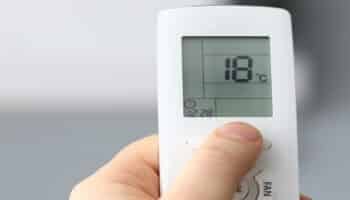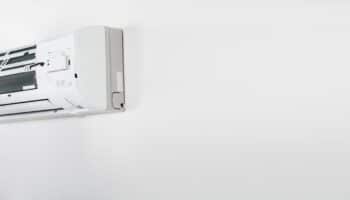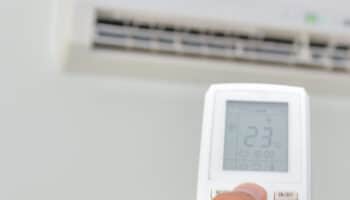We've independently reviewed this article to make sure it's as accurate as we can make it.
To find out more about our article creation and review process, check out our editorial guidelines.
Wondering why your air conditioner keeps filling up with water? Perhaps cursing a bit because you’re always needing to empty the bucket?
It’s a pain. But don’t worry, you’re not alone.
All across the country are other frustrated air conditioners owners. Feeling like they’re emptying enough water to fill a bath!
The good news is that all of us have put our heads together, and in this guide we’ve covered all the main reasons why air conditioners keep filling with water (and how to fix them). The short answer is…
If your air conditioner keeps filling with water, you need to make sure the drain hole is clear. If it is, you could just be in a high humidity environment. otherwise, it could be a faulty condensate pump or evaporator coil that’s causing your ac to keep filling with water.
If some of those solutions sound tricky, don’t worry. We’ll walk you through all the different fixes.
Read on and let’s turn your air conditioner from a water-logged swimming pool to an efficient appliance.
Fixing An Air Conditioner That Keeps Filling With Water
To summarise, here’s the 5 main reasons that cause an air conditioner to fill with water too regularly:
Why a portable air conditioner may be filling up too fast
| Problems with the Float Mechanism |
| Drain Hole or Hose is Plugged |
| Faulty Condensate Pump |
| Faulty Evaporator Coil |
| High Humidity! |
Let me start by telling you that your portable air conditioner should be filling up with water. It’s part of their design.
Some models feature condensation systems that exhaust water vapor back into the air. However, if you live in a humid climate, they won’t be able to keep up, and water will still collect in the reservoir, so you’ll still need to drain out the collected water, either manually or automatically.
The process of conditioning the air means that the unit is pulling humidity from the air. But there may be times when more water is collecting than normal. This might be an indicator of one of the following issues.
Before we get started, make sure the power to your air conditioner is off!
1. Dirty Air Filter
Yes, once again, the air filter could be the culprit. Frankly, a dirty air filter is the cause of many HVAC issues so it should always be the thing you check first.
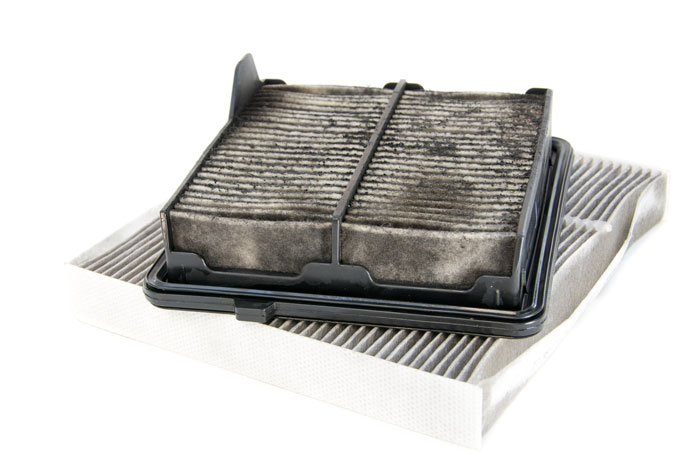
Portable air conditioners will have at least one filter, so be sure to check how many your model has.
Remember the purpose of the filter. Air from your environment is pulled through it, cooled, and then pushed back out. The thing is, your home has a lot of microscopic debris floating around. And some not so microscopic. Things like:
- Dust (which can be made up of dead skin cells, pet dander, insect waste, furniture and food particles, soil, pollutants, and more)
- Pet hair
- Human hair
Anyone else suddenly grossed out at the thought of dust collecting in their homes?
Eventually, all that debris builds up on the filter, impeding airflow. Once airflow is impacted, your air conditioner can’t work as it should, causing excess water to build up and accumulate much faster than normal.
Solution: Check your manual to confirm how many filters your model has. Find out how often to change them and the proper steps.
And by the way, dust can build up everywhere.
2. Problems with the Float Mechanism
Does your air conditioner notify you when it’s time to be drained? Or automatically shut off when the tank is full?
If so, you likely have a model that has a float. Something similar to how the fuel gauge in your car knows how much gas you have. There’s a float in the tank that monitors the level.
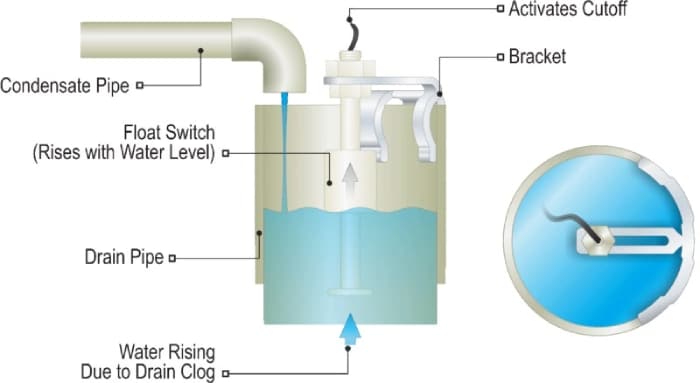
In your portable air conditioner, the float could be at the bottom of a model that holds and auto drains the water, or in the type that has a container that needs to be manually emptied.
When water levels reach a certain level, the float sends a signal to either notify you or shut the unit off.
Like your filter, the float can pick up debris over time. If this is happening, at some point your float won’t be able to do its job.
Solution: If you have a float and where it is will depend on your model. Check your manual if you don’t know where it is. Then it’s just a matter of accessing the float and cleaning it off.
3. Drain Hole or Hose is Plugged
Do you have a hose attached to the drain hole or spout? This is a huge convenience since it means you don’t need to keep manually draining your water condensate tank.
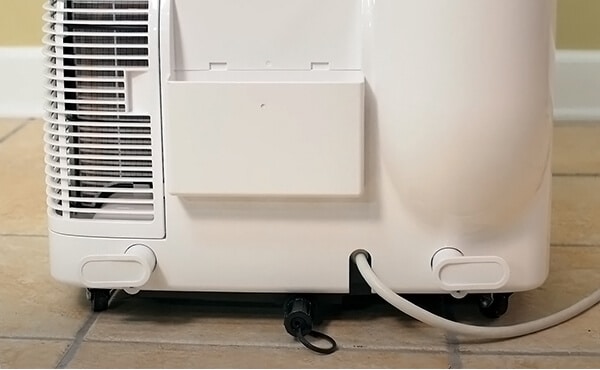
However, if the hose or spout gets clogged, you know what will happen right? Water will back up and your tank will fill faster than normal.
While in other situations it’s often a build-up of dirt and debris you need to worry about, in this case, it’s usually a buildup of slimy water within the hose or spout. It sticks to the inner walls of the hose and gets thicker over time, narrowing the path the water runs through.
It’s a lot like bad cholesterol attaching to the inside of your arteries and eventually choking off your blood supply.
Solution: Remove the hose from the unit and clean it by pouring some bleach through it. The bleach will kill any organic gunk and slime already there, but it will help ward off future growth as well. Try doing this every month throughout the cooling season to keep water running freely.
4. Faulty Condensate Pump
There aren’t a lot of portable air conditioners that come with an integrated condensate pump but there are a few. More often, users hook up a condensate pump aftermarket. It saves them the hassle of always draining their AC manually.
If the pump wasn’t installed properly, it can cause problems. Like your tank filling up too quickly.
Solution: If you’ve added a pump to your AC, pull out the manual and make sure you followed the instructions correctly. You can also follow the troubleshooting steps in this video.
5. Faulty Evaporator Coil
Some portable air conditioners are fully evaporative. Meaning very little water should collect. However, if there is an issue with the evaporative element, water will collect. If this is the case, you’ll need to have your AC repaired.
6. High Humidity
This really isn’t a fault in your air conditioner. If you’re using it in a room for the very first time or if it’s an overly humid day, there is a lot of water in the air. That water is going to end up in your tank.
Again, that isn’t a fault, it’s just part of the process.
Solution: If you live in an area with extreme humidity, you might want to think about installing a condensate pump. This will allow you to drain the water automatically, even if you don’t have a floor drain nearby.
Some pumps come with 20 feet of hose, so that gives you plenty of room between wherever you have your AC situated and a sink. Or any hardware store should be able to supply you with the length you need.
Conclusion
Before you start worrying that there’s something wrong with your air conditioner, take a look at your local weather report. Or if you have a hygrometer in your home, look at that. What is the current outdoor and or indoor humidity?
If it’s high your issue could be simply that your portable air conditioner can’t keep up. Remember, the process of “conditioning” your air involves pulling moisture—water—from the air. In very humid situations there will be a lot of water.
As suggested above, you might want to solve this problem by adding a condensate pump.
The other reasons for your air conditioner to fill with water too quickly—or at least quicker than is normal for you—are:
- Dirty Air Filter
- Problems with the Float Mechanism
- Drain Hole or Hose is Plugged
- Faulty Condensate Pump
- Faulty Evaporator Coil
Fortunately, most of them are problems you can troubleshoot yourself. But if you’re uncomfortable with any of the steps outlined above, call a service person to come to fix it.
Thanks for reading through. Hopefully, we’ve been able to address your issue and you were able to fix it. Why not check out our related articles below? Maybe we can help with something else too.





